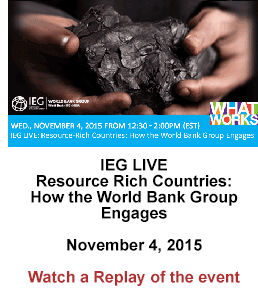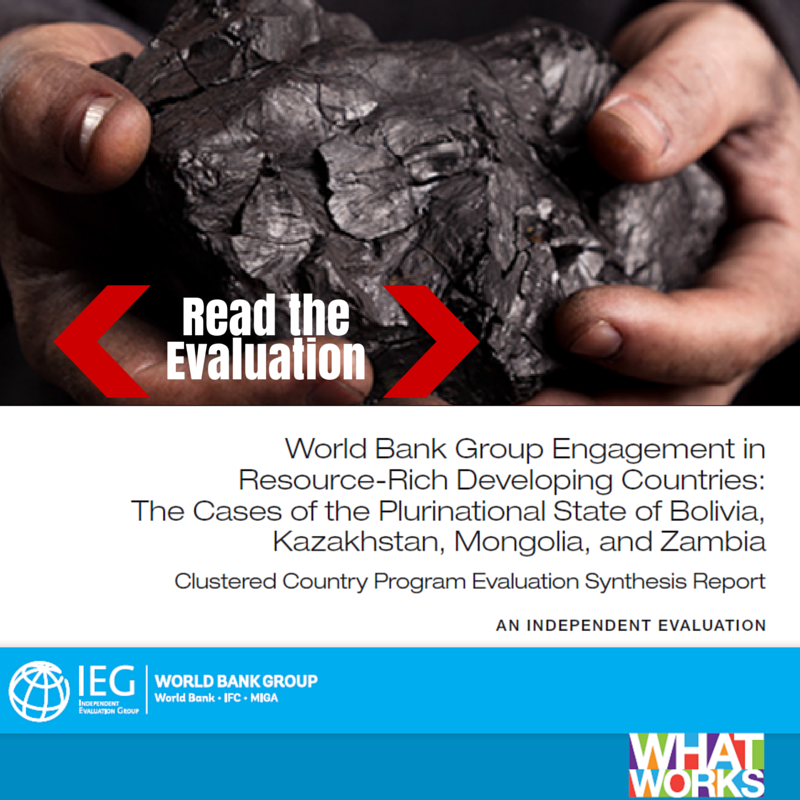Sandra Bullock, Resource Rich Countries and what [even] World Bankers can learn from Evaluation
How can the World Bank Group help countries better manage their natural wealth? Insights from IEG's evaluation on resource rich countries.
How can the World Bank Group help countries better manage their natural wealth? Insights from IEG's evaluation on resource rich countries.
By:![Sandra Bullock, Resource Rich Countries and what [even] World Bankers can learn from Evaluation Sandra Bullock, Resource Rich Countries and what [even] World Bankers can learn from Evaluation](/sites/default/files/Data/styles/inner_page_style/public/Blog/blog_photo_3.png?itok=lcssL9Lg)
 "If you don't want to read the evaluation: Go and watch that movie with Sandra Bullock". Whoops. What now? We are supposed to discuss insights of the Independent Evaluation Group (IEG)'s new report on "Resource Rich Countries". As the discussion's moderator, I have just asked one of the panelists a tricky question about economic diversification - one of the often postulated, rarely properly defined and even less so achieved goals in countries that heavily depend on minerals or oil in order to get their economies going and to build prosperity for the future. The panelist, Marcelo Giugale, is one of the World Bank's brightest minds on economic growth. And rather than answering my question, he prods us all to go and see Our Brand is Crisis. Even more mysterious: our audience, serious looking economists and managers from the World Bank and IMF, country representatives and CSOs, evaluators and activists - they all seem to love the idea.
"If you don't want to read the evaluation: Go and watch that movie with Sandra Bullock". Whoops. What now? We are supposed to discuss insights of the Independent Evaluation Group (IEG)'s new report on "Resource Rich Countries". As the discussion's moderator, I have just asked one of the panelists a tricky question about economic diversification - one of the often postulated, rarely properly defined and even less so achieved goals in countries that heavily depend on minerals or oil in order to get their economies going and to build prosperity for the future. The panelist, Marcelo Giugale, is one of the World Bank's brightest minds on economic growth. And rather than answering my question, he prods us all to go and see Our Brand is Crisis. Even more mysterious: our audience, serious looking economists and managers from the World Bank and IMF, country representatives and CSOs, evaluators and activists - they all seem to love the idea.
The movie is a political satire about a K Street consultant who gets brought into a Latin-American country and helps an until then largely ignored political candidate win elections and the country's presidency - with huge implications, later on, for that country's policies for and investment in their mining sector. Politics, Marcelo points out, are tough to predict. And when IEG's evaluation notes that the World Bank Group does not always succeed in engaging all relevant local partners in the dialogue on key policies for resource rich countries, the point is correct - but the explanation for the shortcoming is simple: Without the benefit of hindsight, knowing who the key local partners of the future are and how to engage with them early on is sometimes a tough call.
The Hollywood-illustrations of the evaluation's insights keep coming. Chas Feinstein, Director with the World Bank's Energy and Extractives Global Practice takes the audience to Man on Wire, a documentary about a young Frenchman who tied a rope between the twin towers in New York and actually walked it, despite the risk of a dramatic fall. "Working in extractives is like walking on a tightrope," Chas says, pointing to the politics involved in everything to do with revenues from extractives, and noting how governments and political parties, private investors and operators, and civil society, all seek influence and pull into different directions. There is a very dark side, with huge risks of environmental degradation, corruption and economic mismanagement, but there is also a huge potential up-side. &"It's a balancing act, to meaningfully engage," Chas argues, one that the evaluation nevertheless finds the World Bank Group well positioned and technically equipped to effectively deliver on, specifically when working with the IMF on supporting prudent fiscal policies and when developing capacity of specific government agencies while encouraging public demand and ownership.
The movie theme continues. "I don't like the new James Bond movie," says Clare Short, Chair of the Extractive Industries Transparency Initiative (EITI). Perhaps because it's not about extractives, or maybe because it takes place in Mexico, Austria and Morocco, neither of which have (yet?) signed on to this important initiative. The EITI stimulates the demand side for good governance and transparency in the extractives sectors, by now in 49 countries, and the IEG evaluation praises it for its effectiveness. How is it going, I ask? "It's like pulling teeth," the veteran politician says with a good smile, "but it's incredibly important - Before EITI began working, informed debate in its signatory countries was practically impossible: no one even knew what was in the contracts, what the revenue flow was, what the production was," she remembers. And yes, in non-EITI countries the situation looks different, confirms Farrukh Iqbal, Chief Technical Specialist with the World Bank's Middle Eastern regional team, and formerly in charge of the World Bank's programs with the Gulf countries. Issues of transparency plague many of the non-EITI countries, and this makes it tougher for the World Bank to engage. But where she works, Clare Short says, she has seen a sea-change in the debate. "There is lots, and lots, and lots of data," she says, challenging everyone to now move towards actually using the information to figure out how to spend the revenues wisely for the future of the countries.
The discussion is lively and controversial. Should more attention be paid to governance? And could the World Bank get engaged in setting up revenue management funds? Should environmental externalities be addressed more effectively? Can revenues be used to help eliminate poverty or to address "the monster of climate change?" Clare Short suggests an increasingly important role for knowledge sharing and learning from the past. And she compliments the evaluators. "You are trying to shift the role of evaluation," she says, noting how important capturing lessons in a non-punitive way is for formulating aspirations to do better. Giugale points to the unusual format of the evaluation - a "clustered country program evaluation", seeking to exploit the learning potential of looking across a group of countries, in this case Bolivia, Kazakhstan, Mongolia and Zambia. They have one common characteristic - rich endowment with and dependence on the extraction of non-renewable natural resources - but are otherwise a fairly heterogeneous group. "It is the heterogeneity that allows maximizing the learning value of the evaluation," explains Konstantin Atanesyan, the Senior Evaluation Officer who had led the research. And Giugale offers a nice analogy for the non-evaluators in the audience: "This is like inviting people for dinner, and you pick the guests similar enough so that they can talk to each other but different enough to allow for interesting conversations."
Do other movies come up to illustrate some of the evaluation's messages? Avatar comes to mind - an epic movie telling the fictional and futuristic story of someone being sent by a mining company to engage with a local community on another planet, ending up, more by default than intent, strengthening that community's capacity to engage with the mining company. This is indeed one of the evaluation's key insights on what the World Bank Group should do more of - build country capacity to negotiate with extractives companies, something that others, notably Botswana, have done successfully on their own. Should this, or something else, be part of a "consistent framework for engagement with Resource Rich Developing Countries" for the World Bank Group? Unlikely so, confirm the World Bankers on the panel. "We are a very client oriented organization. We do what the client wants," explains Giugale. And while this means that "we never give up on a country", it also means "not imposing our own agenda."
So with all the learning from the past, and new insights and players on the scene, is anything going to be different? When will the poor finally benefit from resource extraction? Is there a next phase for the engagement with resource rich countries? What is the strategy? The audience and the panelists are humble, three quarters of the audience find the challenges daunting and agree that their organization has a lot to learn - but they vote, right there, during the evaluation's launch event, that they feel their clients really need institutions like the World Bank Group to step in and figure out how to support resource rich countries in pursuing better choices. Giugale looks ahead. "Maybe we need to bring some of that rent to the individuals in the countries. Already, 70 developing countries make direct transfers to the poor. Even if only a small portion of the rents was transferred to the population, the demand for the accountability would be huge. Approaches like this have not been part of the World Bank's engagement with resource rich countries, says Short. But they have been implemented, successfully so, by several First Nations in Canada. "What proportion of the extractives industries' revenue would it take, in a country such as Equatorial Guinea, to eliminate poverty ?" asks Giugale. "Really only 6%!" This seems a smart way of getting the extractives industries to support the elimination of poverty and the building of prosperity, the two long-term goals of the World Bank Group. And why is it not happening? Political scientists suggest that such an agenda would only ever be put forward by a "desperate political candidate", someone with little to lose. Perhaps, though, the idea should be made more palatable to mainstream politicians. Possibly Hollywood can help - in creating an opening in the conversation? Maybe James Cameron should do a sequel to Avatar that includes revenue transfers to the Navis, the tree-based community? But in the meantime, something to seriously think about for policy makers and development professionals.
 And the evaluators? They certainly got good input from the panel discussion as well as from the many questions that came in from the audience, both in the room in the World Bank's main building in Washington and from those who joined the dialogue online. Broadening the recommendation on rural strategies; re-thinking the argument on economic diversification - a consequence and not an input of relevant policies; many good points were raised. The depth, openness and forward-looking nature of the dialogue confirmed how both the methodology and the style of the evaluation have opened hearts and minds of the many experts and development professionals in the audience, able to engage on the topic rather than going on the defense. "We truly wanted to learn lessons across countries," said Nick York, Director at IEG, of the country cluster evaluation approach. "little did we know how interesting this would become when we started!"
And the evaluators? They certainly got good input from the panel discussion as well as from the many questions that came in from the audience, both in the room in the World Bank's main building in Washington and from those who joined the dialogue online. Broadening the recommendation on rural strategies; re-thinking the argument on economic diversification - a consequence and not an input of relevant policies; many good points were raised. The depth, openness and forward-looking nature of the dialogue confirmed how both the methodology and the style of the evaluation have opened hearts and minds of the many experts and development professionals in the audience, able to engage on the topic rather than going on the defense. "We truly wanted to learn lessons across countries," said Nick York, Director at IEG, of the country cluster evaluation approach. "little did we know how interesting this would become when we started!"

Comments
Add new comment